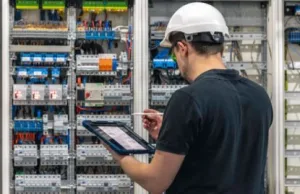Master the E2 Exam: Your Path to Becoming a Certified Commercial Electrical Inspector

If you’re aiming to build a career in electrical inspection, you’re setting your sights on a crucial and highly respected position in the construction and public safety industries. Electrical inspectors play a critical role in ensuring that commercial and residential buildings meet the necessary safety standards
How to Prepare for the Electrical Inspector Test
Success on the electrical inspector test hinges on methodical preparation. Here’s how to approach your study plan:
- Understand the Test Blueprint
Familiarize yourself with the topics covered, which may include:
- General Electrical Theory
- NEC Standards and Interpretations
- Commercial Wiring Methods
- Safety Protocols
- Use Official Codebooks and Resources
Make sure you have the latest edition of the NEC, as questions are often directly based on it. Supplemental handbooks and code commentaries also offer valuable insight.
- Enroll in Review Courses
Consider taking a prep course either online or in person. These courses often break down the exam into manageable units and offer expert-led instruction.
- Create a Study Schedule
Devote time weekly to cover various topics. Focus more time on areas where you feel least confident.
- Simulate the Exam Experience
Although we won’t share specific practice questions here, taking timed mock exams or self-assessments is essential for success. They help you get used to the format and pressure of the real test.
What Does an Electrical Inspector Do?
An electrical inspector is responsible for examining electrical systems in buildings to ensure they are safe, compliant with code, and installed correctly. They inspect wiring, circuit breakers, lighting, grounding systems, and more. Their job is essential to preventing electrical fires, shock hazards, and structural damage.
Why Become a Certified Electrical Inspector?
Certification can significantly impact your career in several ways:
- Higher Employability: Certified professionals are more likely to be hired by municipalities, engineering firms, and inspection agencies.
- Increased Salary: Certifications often come with a bump in pay.
- Professional Credibility: It signals that you meet national standards and can be trusted with complex tasks.
- Continued Education: Staying certified keeps you informed about evolving electrical codes and safety regulations.
Understanding the Electrical Inspector Test
The electrical inspector test is designed to evaluate your understanding of the National Electrical Code (NEC), local building codes, and general electrical theory. The exam is comprehensive and requires familiarity with complex standards and best practices.
Why the Electrical Inspector Test Matters
Taking and passing the electrical inspector test is not just a formality—it’s a career-defining milestone. Here’s why it’s so important:
- Safety First: Electrical systems must meet strict safety standards to protect lives and property. Inspectors ensure compliance.
- Legal Requirements: Many jurisdictions require certification to perform inspections legally.
- Professional Growth: Passing the test expands your professional capabilities, allowing you to supervise, manage, or consult on projects.
- Reputation: Certification enhances your standing among peers and clients.
The electrical inspector test also reflects your commitment to the highest standards of workmanship and regulatory compliance.
Common Challenges and How to Overcome Them
- Complex Code Language
Many candidates struggle with the technical language in NEC and local codes. Don’t just read—interpret the material. Use study groups and online forums to clarify doubts.
- Test Anxiety
The stakes of the electrical inspector test can cause stress. Practice relaxation techniques like deep breathing, and simulate test conditions to reduce surprises on exam day.
- Time Management
Some test-takers spend too much time on difficult questions. Learn to pace yourself. Flag tough questions and return to them later.
Career Opportunities After Passing the Electrical Inspector Test
Once you’re certified, a range of professional roles becomes available:
- Municipal Inspector
Work for city or county governments to inspect public and private electrical installations.
- Construction Project Auditor
Ensure that electrical work on large-scale developments complies with codes.
- Electrical Safety Consultant
Advise companies on best practices and code compliance.
- Independent Contractor
Run your own inspection service. Certification boosts your credibility significantly.
Final Thoughts: Your Future as a Certified Electrical Inspector
Becoming a certified electrical inspector takes commitment, preparation, and focus. Passing the electrical inspector test is your gateway into a career that not only offers financial stability but also the satisfaction of ensuring public safety and project integrity.
Treat your preparation with the seriousness it deserves. Use every tool available, seek mentorship, and immerse yourself in the codes and concepts. Once you pass the electrical inspector test, you’ll be well-equipped to pursue a fulfilling and respected profession.
